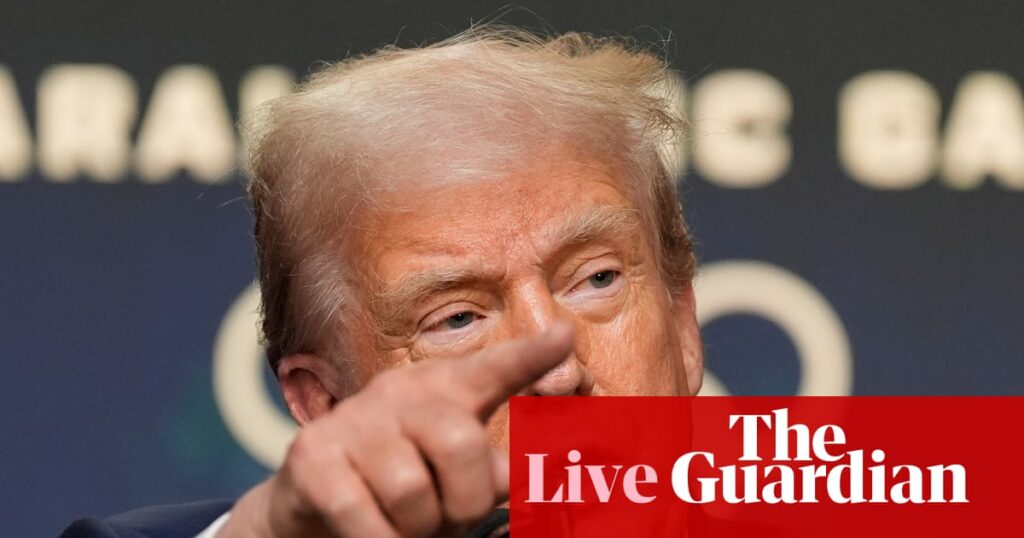US Trump talking to Ukraine’s Zelenskyy hours after Putin-Witkoff meeting
Both Axios and Reuters are reporting that US president Donald Trump is now speaking with the Ukrainian president, Volodymyr Zelenskyy.
Let’s see what this conversation brings.
Key events
‘Meeting went well’ with Russians engaging, but sanctions still expected on Friday – White House official
The White House official quoted by Reuters added that the Putin-Witkoff meeting went well, and “the Russians are eager to continue engaging” with the US, but the secondary sanctions were still expected to be implemented on Friday.
In the meantime, Trump and Zelenskyy have reportedly ended their call now, so we may be getting some more details from them soon.
Reuters is carrying a one-line quote from a White House official saying that secondary sanctions on Russia are expected to be implemented on Friday.
I will bring you more details as soon as we have them.
You’re now up-to-date on other events in Europe.
I am watching out for updates from that Trump-Zelenskyy call and will bring you more as soon as we have it.
Inga Ruginienė picked as Lithuania’s likely next prime minister
Lithuania’s ruling Social Democrats party picked social affairs minister Inga Ruginienė as its candidate for prime minister, making her the likely successor to Gintautas Paluckas who resigned on Monday, Reuters reported.
The 44-year-old social affairs minister and former trade union leader Ruginienė will face a confidence vote in Lithuania’s parliament and must get lawmakers’ approval for her cabinet programme before taking office.
Ruginienė has been the leader of Lithuania’s trade union confederation since 2018, before joining Paluckas’ cabinet in 2024. “I am guided by left-wing, social democrat values“, she told the country’s public broadcaster this week.
The Social Democrat party holds 52 out of 141 seats in parliament and has formed a government coalition with the centre-left For Lithuania and populist Nemunas Dawn.
Finance Minister Rimantas Šadžius is currently the acting prime minister until a new cabinet is sworn in.
Journalist missing in Norway survived five days in wilderness with leg injury
But we also got some good news from Norway, where rescuers have found the award-winning environmental journalist Alec Luhn alive after he went missing in the remote Folgefonna national park and survived nearly a week alone in the wilderness with a serious leg injury.
Luhn, a US-born reporter who has worked for the New York Times and the Atlantic and was a regular Russia correspondent for the Guardian from 2013 to 2017, was reported missing on Monday after he failed to catch a flight to the UK from Bergen.
At a press briefing from Haukeland hospital in Bergen, the head of the air ambulance service and trauma centre, Geir Arne Sunde, said Luhn had hurt himself on the evening he set out. “He is seriously injured, but not critically injured,” he said, adding that Luhn was awake, relieved and grateful for his rescue.
“He has managed in the mountain in very bad weather for five days, without much food or drink,” Sunde said. “He has been very lucky.”
France battles ‘unprecedented’ wildfires, killing at least one
Angelique Chrisafis
Hundreds of firefighters are battling to stop the spread of a fast-moving wildfire in southern France, after one woman died and nine people were injured as the blaze scorched a vast area of the Corbières hills.
The fire, which started on Tuesday afternoon, has burned 13,000 hectares inland from the Mediterranean near the Spanish border, and is the largest and fastest-spreading wildfire in France this summer.
It began in the village of Ribaute in the Aude department, spreading across the rural, wooded area of the Corbières, famous for its vineyards and medieval villages.
A woman died in her home and one person was in a critical condition with severe burns, according to the Aude prefecture. Several firefighters were also injured. At least 25 homes were destroyed or damaged.
This is “a disaster of unprecedented scale”, the firefighter spokesperson Eric Brocardi told RTL radio, saying the fire was spreading at 3.4mph (5.5km/h).
“It’s a catastrophe of unprecedented scale,” prime minister François Bayrou said as he visited Saint-Laurent-de-la-Cabrerisse.
“What is happening today is linked to global warming and linked to drought,” he said.
‘God save cacio e pepe’ as inclusion of butter in UK recipe draws outrage from Italian media

Angela Giuffrida
One of the UK’s most popular food websites has cooked up a storm in Italy after allegedly botching a recipe for the traditional Roman pasta dish, cacio e pepe, drawing diplomatic representations from the main trade association for Italian restaurateurs.
A recipe on Good Food, formerly owned by the BBC, which continues to licence the web address bbcgoodfood.com – described cacio e pepe, a culinary institution in the Italian capital, as a “store cupboard favourite” that could easily be whipped up for “a speedy lunch” using “four simple ingredients – spaghetti, pepper, parmesan and butter”.
The notion that making cacio e pepe is easy was bad enough, but the presence of parmesan cheese and butter has been deemed a cardinal sin. Traditional cacio e pepe contains three ingredients: pasta (usually tonnarelli, a type of spaghetti), pecorino Romano cheese and black pepper.
Such is the fury, Fiepet Confesercenti, an association that represents restaurants in Italy, said it would demand a correction from the website in order to “safeguard this iconic dish”. Furthermore, it has taken up the issue with the British embassy in Rome.
Claudio Pica, the president of the Rome unit for Fiepet Confesercenti, said the association was “astonished” to see the recipe on such a popular and esteemed food site, adding that letters have been sent to Immediate Media, the site’s owner, and the British ambassador to Rome, Edward Llewellyn.
“This iconic dish, traditionally from Rome and the Lazio region, has been a staple of Italian cuisine for years, so much so it has been replicated even beyond Italy’s borders,” he added. “We regret to contradict the historic and authoritative British media, but the original recipe for cacio e pepe excludes parmesan and butter. There are not four ingredients, but three: pasta, pepper and pecorino.”
Italian newspapers have had a field day over the controversy, with the Rome-based Il Messaggero writing: “Paraphrasing the famous British anthem ‘God save the king’, Rome restaurateurs are now saying: ‘God save the cacio e pepe.”
Italian government gives final approval for bridge linking Sicily to mainland

Angela Giuffrida
in Rome
The Italian government has given the final approval for the construction of a multibillion-euro bridge linking Sicily to the mainland, a project that has been a topic of debate since at least the late 1960s but has been held back by a litany of concerns, including the huge cost, seismic risks and mafia infiltration.
Giorgia Meloni’s rightwing government has set aside €13.5bn to build what would be the longest single-span bridge in the world. A dream of Italy’s late former prime minister Silvio Berlusconi and revived soon after Meloni’s government came to power in 2022, the 3.7km bridge and its surrounding facilities are expected to take 10 years to build.
Cars, trains and foot passengers currently cross the Strait of Messina, between the Sicilian city of the same name and Villa San Giovanni in Calabria, by ferry – a journey that takes about 30 minutes.
The green light for the bridge, which the government argues would give a much-needed economic boost to Italy’s poorer south, was given by an inter-ministerial committee on Wednesday, said the transport minister, Matteo Salvini, who is also the project’s chief backer. Salvini described it as “a metro over the strait”.

Jakub Krupa
As we await an update from Trump-Zelenskyy call, let’s take a quick look at other events in Europe.
World awaits Trump’s next move as Russia ceasefire deadline approaches

Patrick Wintour
Diplomatic editor
After taking six months to conclude that Vladimir Putin may not be a kindred transactional authoritarian leader but an ideological nationalist seeking the return of what “belongs to Russia”, the deadline Donald Trump set for the Russian president to agree a Ukraine ceasefire or face US sanctions on oil exports arrives on Friday.
What Trump – who some had claimed was a Russian asset – does next to punish Putin could define his presidency.
It is a remarkable turnaround and one that seasoned Trump watchers such as Michael McFaul, the former US ambassador to Russia, said they had never expected.
But as the deadline approaches, there is lingering scepticism about how far Trump will go. He has dispatched his special envoy, Steve Witkoff, to Moscow for the fifth time for last-minute talks and on Friday Trump admitted he did not think sanctions would have much impact as Russians are “wily characters and pretty good at avoiding sanctions”.
He has also given himself maximum room for political manoeuvre by ensuring the US Senate did not pass legislation before its summer recess that would have empowered him to slap bone-crushing 500% tariffs on exports from countries that import Russian oil, principally India, China, Brazil and Turkey.
The one prerequisite is that Trump must not back off, McFaul said. “Making threats and not carrying through with them is one of the biggest mistakes you can make in diplomacy.” The former ambassador recalled George Shultz, the great Reagan-era US secretary of state, saying “never point a gun at anyone unless you are prepared to shoot”.
US Trump talking to Ukraine’s Zelenskyy hours after Putin-Witkoff meeting
Both Axios and Reuters are reporting that US president Donald Trump is now speaking with the Ukrainian president, Volodymyr Zelenskyy.
Let’s see what this conversation brings.
US to decide on Russia sanctions later today, Rubio says
US state secretary Marco Rubio said he was hopeful of making announcements later on Wednesday on whether potential sanctions against Russia would still proceed this week, Reuters reported.
Rubio said he has spoken to US special envoy Steve Witkoff, who is on his way back from a trip to Russia, and would have more discussions throughout the day.
“We’ll have more to say about that later on today,” Rubio said when asked if sanctions on Russia would go into effect later this week, adding that there would hopefully be some announcements soon.
Maybe positive, maybe not.
Poland’s Nawrocki wants to see army grow to 300,000, largest Nato army in Europe

Jakub Krupa
As we await more updates from Moscow or Washington, let’s briefly go back to Warsaw for my first full report on Karol Nawrocki’s inauguration as the new Polish president.
In the last few minutes, he has been formally taking over the role of the military commander in chief.
Addressing soldiers in Warsaw, he said his ambition is to grow the Polish army to “at least 300,000” from around 210,000 now, making it the largest Nato army in Europe.


